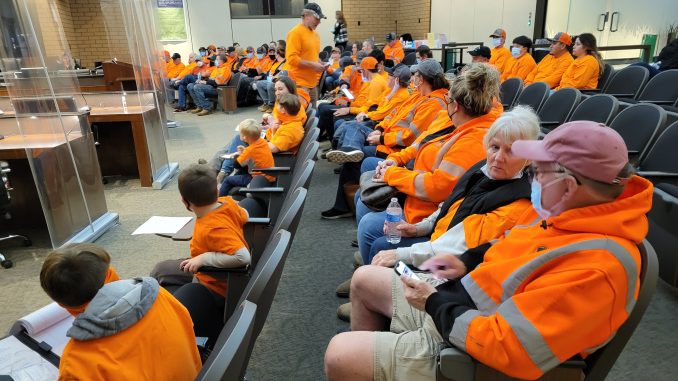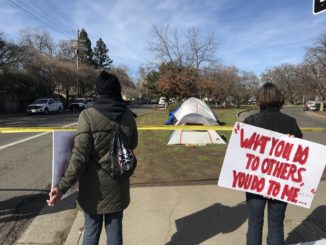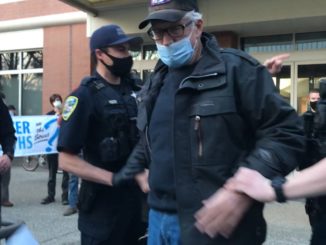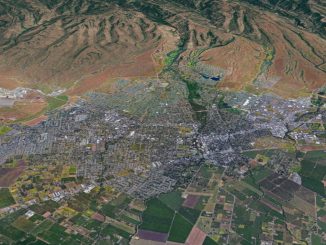
The first indication that the Chico City Council meeting Tuesday night (Dec. 7) would have a distinct tone came 45 minutes before the start, when a dozen orange-clad city workers gathered at a food truck alongside the municipal center parking lot.
Their group had tripled in size, including the addition of a few families, by the time they settled into the council chambers seats a half-hour ahead of the meeting. City Manager Mark Orme and other department heads greeted them warmly as each walked in—several expressing pride.
The assembled workers were from Public Works, the city department responsible for operations and maintenance. They came on the night the council was to approve hiring a new public works director of engineering, but they were there to talk about grievances a dozen years in the making.
Public Works staff—through their union, SEIU—are among the employee organizations bargaining with the city. Council members received an update on negotiations in closed session, during which they took no action; in open session, Public Works employees made a direct appeal—all standing as three of their colleagues addressed the dais during business from the floor public comment.
Steven Hutton told the council that most of the workers cannot afford to live in the city; that the majority commute in from 30 minutes to an hour away. He said their families don’t enjoy the Christmas tree lighting ceremony they set up. “I want to be part of this community,” he continued, “but without the city investing in me, it’s not going to happen.”
James West likewise requested the council, “Please support us.” He mentioned the high cost of fuel as a challenge in living outside the city. James Erven, a 15-year employee, listed various roles Public Works employees fill, such as clean-up from last month’s rainstorm, in saying, “The work we do should be considered essential service.” He concluded by noting they “have to work early in the morning,” so the group exited after he finished speaking.
Del Mallory, area director for SEIU Local 1021 and the workers’ chief negotiator, told the CN&R that the city offered a wage increase comparable to other employees, but this did not take into account that Public Works employees have not gotten a raise in 12 years.
“The city is generating more revenue than they ever have before,” Mallory said, “and we’re looking at not substantial wage increases but at least wage increases that would offset the cost of living. The city at this point is unwilling to do that even though they have the financial capacity to do it.”
Orme, who declined to speak about specifics due to ongoing negotiations, reiterated to the CN&R his pride in the employees—for their work and for coming to the meeting.
“They’re true professionals,” he said. “They work so diligently every day, and one of the things I continue to find is they want the city to be as ready to deal with the issues that are happening, time and time again….
“The first seven years of me being at the city, the strategic plan has been one thing: budget. They’ve been very patient through all that. I very much appreciate that, so I understand where they’re coming from.”
Mayor Andrew Coolidge echoed the message.
“Do I think they work hard and deserve more? Absolutely,” he told the CN&R by phone Wednesday morning (Dec. 8). “Do I want to see what I can do within the confines of the budget that we have? Definitely. Do I also realize the city of Chico is in the best financial shape it’s been in for a really long time? Yes. So is this the time? Potentially, yes.
“I think it’s really time to show the employees of Chico, after a long time of not being valued, that this City Council does value their contribution to the city.”
Other items
The council had a relatively light agenda, highlighted by appointments to the Climate Action Commission, an initial presentation on redistricting, a quick discussion of cannabis businesses and a reallocation of nearly $1 million in federal funding toward the city’s homelessness plan.
Without deliberation, council members unanimously ratified climate commission appointments from their colleagues whose seats were contested in 2020. They approved Ashley Koller (appointed by Councilman Dale Bennett), Joshua Pierce (Sean Morgan), Ann Bykerk-Kauffman (Deepika Tandon) and Brian Kress (Coolidge) for full terms running through 2024. The council needed two ballots to appoint Kirk Monfort, a former planning commissioner, to a short-term commission term that expires next December.
A harbinger of contention briefly surfaced during the redistricting item. City staff selected ARDA Demographics of Santa Ana as its consultant for the process, which Butte County is undergoing amid partisan discord and allegations of gerrymandering (see “And then there were three”). After ARDA Senior Demographer Claudio Gallegos gave an overview of redistricting, Morgan teed up inquisitorial questions.
“Have you been a district director for a member of Congress?”
Yes, Gallegos answered, for Rep. Lou Correa (D-Santa Ana).
“And do you think you can draw unbiased maps?”
“Of course,” Gallegos said.
“You understand why I’m asking,” Morgan pressed.
“Yes. He’s also known as one of the most moderate Democrats in Congress.”
The council moved on with apolitical inquiries, but Morgan apparently wasn’t convinced by Gallegos’ response. Speaking with the CN&R afterward, he cited Gallegos’ quote in a January 2020 Los Angeles Times article about bringing local progressives into office—“but there aren’t any conservative groups that do this [type of consulting],” Morgan added, “so we have to rely on our council to do the right thing, and they will.”
A former mayor who’s served on the council, Morgan said the process “will be politicized. It’s funny: Alliance, Ohio, two Friday nights ago, [I] turn on the TV, they’re talking about all this mad, crazy fighting going on with redistricting, and I’m like, ‘How is Butte County on TV in Alliance, Ohio?’
“Redistricting is political—it is what it is. Last time, when we set up the districts [for the 2020 election], that was the dirtiest politicking I’ve seen in Chico…. You will not see that here. Someone will try.
“I can almost already tell you that the first map that I think I’ll approve is the first one [Gallegos] talked about: the smallest adjustments that redistribute everything. Because we don’t need any more massive partisan fighting like the county is going through.”
The council found consensus—mostly—on direction to City Attorney Vince Ewing about commercial cannabis. At the Nov. 3 meeting, after hearing appeals on dispensary applications, the council agreed to agendize a discussion on other industry sectors. Tuesday night, the council agreed to have staff (i.e., Ewing) analyze the city’s cannabis ordinance in relation to distribution, manufacturing, testing and non-storefront retail.
The latter incorporates delivery. Morgan contended that delivery will be limited to the three approved dispensaries and should not be expanded nor discussed. Councilwoman Alex Brown, who served on the committee that drafted the ordinance, pushed for the inclusion of delivery in the analysis—which Coolidge confirmed to the CN&R was the direction to Ewing.
“We’ll talk about it all,” the mayor said. “I don’t know if there’s a will of the council to explore further delivery services.”
Finally, in an item added late to the agenda, the council unanimously authorized the transfer of $900,000 in American Rescue Plan funds from two Public Works projects (ultraviolet lighting and broadband) to “intergovernmental initiatives”—which Orme told the council related to ongoing litigation. That would be Warren v. City of Chico, the federal lawsuit filed by eight unhoused plaintiffs, and the BMX site in south Chico where the city and county are partnering on a pallet shelter site under a memorandum of understanding approved by the council at the Nov. 17 meeting.




Be the first to comment